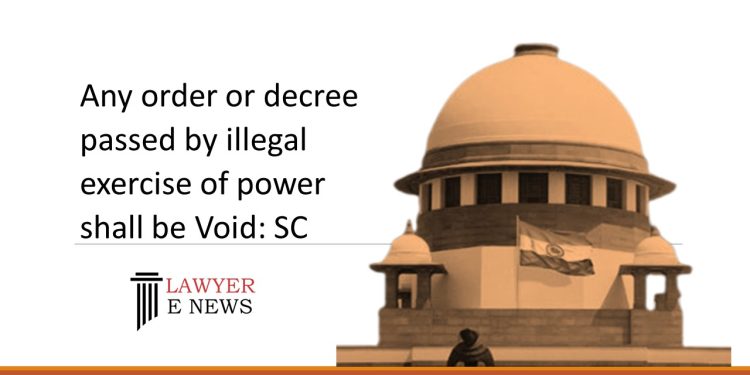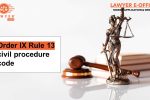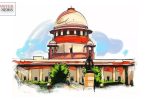Any order or decree passed by illegal exercise of power shall be void: SC

D.D:2-08-2022
Tuesday, the Supreme Court ruled that any order or decree passed through the unlawful use of power as a result of a special Act without the authority of law is null and void.
The bench of Justices K.M. Joseph Hrishikesh Roy stated, “The authority’s lack of jurisdiction cannot be remedied by agreement of the parties. The challenge to an incompetent order may be brought wherever it is sought to be enforced or relied upon, including in execution and collateral proceedings.”
In this case, Prithpal Singh (the adopted son of Sucha Singh) asserted that Sucha Singh bestowed land upon him. Although the suit schedule included additional properties, the plaintiff limited his relief to the land measuring 11 kanals and 15 marlas and none of his adoptive father Sucha Singh’s other lands.
Prithpal Singh filed a civil suit with the Jammu & Kashmir High Court for declaration and possession of land, alleging that the appellants (natural son and daughter of Suchta Singh) forcibly evicted him from the land in question. The High Court ruled in favour of Prithpal Singh.
Mr. Huzefa A. Ahmadi, counsel for the appellants, argued that Sucha Singh did not intend to transfer his ownership right to the plaintiff by accepting the plaintiff as a co-owner. Further, it was argued that the compromise does not comply with the mandate of the law, and since the plaintiff’s claim is based solely on the compromise, the same could not have been granted.
Mr. S.N.Bhat, Counsel for the Respondents, argued that, as the appeal stems from the concurrent findings of three courts that decreed the suit declaring title and possession in favour of the plaintiff, this Court, in exercising its authority under Article 136, should not overturn those findings.
The issues to be considered by the court were:
- Does the compromise dated December 18, 1975 confer title?
- Was registration required for the compromise?
- Whether the doctrine of estoppel applies to the defendants’ challenge to DC’s order.
According to the Supreme Court, the definition of owner is inclusive. It includes both the legal owner/proprietor and anyone claiming through the legal owner. Specifically, the owner’s “adopted sons.” This could hardly grant the plaintiff legal title to Sucha Singh’s land.
The bench stated, “If a special act exercises power without the authority of law, any order or decree passed as a result of this unlawful power exercise will be null and void.” The authority’s lack of jurisdiction cannot be remedied by the consent of the parties. Such an incompetent order may be challenged wherever it is sought to be enforced or relied upon, including in execution or collateral proceedings. As a result, in favour of the defendants, the DC’s order has no legal effect, as it was issued during the application of the Suspension Act of 1975. Being unregistered, the compromise cannot confer title on the respondent.”
According to the Supreme Court, the case records indicate that Sucha Singh revoked the plaintiff’s two wills during his lifetime. This indicates that Sucha Singh was not interested in giving the plaintiff any portion of his property. Even if not, the suit property is Sucha Singh’s self-acquired property, and a donee cannot claim equity in the disposal of self-acquired property by a donor.
Given the preceding, the Supreme Court granted the appeal.
Kuldeep Singh & Anr.
Versus
Prithpal Singh





